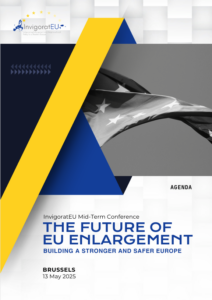Headquarters: Svetog Nauma 7, 11000
Office address: Đorđa Vajferta 13, 11000
Phone:: +381 11 4529 323

After announcing the referendum on changing the Constitution of the Republic of Serbia in the field of justice for 16 January 2022, statements of government representatives could be heard which insinuated that the failure of the referendum would present a halt to Serbia on its European path. On the one hand, this creates an impression that Serbia’s membership in the European Union necessarily requires an affirmative vote in the referendum, and that changing the Constitution is the only measure on which Serbia’s continued European integration is dependent on. Since these types of messages are incorrect, we believe that it is very dangerous and inflammatory to deceive the public, who is not sufficiently informed about the changes to the Constitution that are being put to a referendum.
Although it is undoubtedly true that progress in the negotiating chapter 23 requires a change in the Serbian Constitution in the field of justice, this is the first of several very important changes in the legislative framework and patterns of behaviour expected to achieve judicial independence in the future. It is important to note that the amendments only partially achieve this goal, but also that some solutions do not fully meet the transitional criterion in the part related to the composition of judicial councils. Serbia is expected to amend its legislation following previous amendments to the Constitution, completely freeing the judiciary from political influence, which is the proclaimed goal of the initiated constitutional changes. The vote YES or NO in the referendum on constitutional changes is in any case, not a vote FOR or AGAINST the entire process of European integration of Serbia. We note that Serbia will have to change the Constitution once again by the time it joins the EU since these changes are not the only inconsistency of the Constitution with the obligations that Serbia will have to assume with its EU membership.
We emphasize that the statements of the officials claiming that the failure of the referendum would prevent the change of the Constitution in the next four years and that it would mean a loss of four years in the process of European integration are incorrect. The manner of changing the Constitution of the Republic of Serbia is regulated by the Constitution of the Republic of Serbia, which does not contain timelines, and special articles of the Law on Referendum and People’s Initiative certainly state that the previous version of the newly adopted law will apply to the referendum. The mentioned statements give the impression of looking for excuses and culprits for the past, as well as future failures and delays in the process of negotiations on Serbia’s EU membership, which are primarily the result of the ruling majority’s lack of political will for the necessary reforms.
We would like to emphasize that progress in European integration and commitment to the goal of membership in the European Union are not exclusively measured by the success of constitutional changes, but by the entire approach of the Republic of Serbia to fulfilling all obligations on the road to the EU. To make progress on its path, Serbia must make serious strides in several important areas, from strengthening the independence of the judiciary, which we are talking about now, in the fight against crime and corruption, in strengthening democratic institutions and media freedoms. Nothing, not even the existing Constitution, prevents the Serbian government from working diligently on improvements in these areas in parallel with the process of changing the Constitution, even if citizens do not trust the proposed amendments. However, we have witnessed weak, very slow progress, mostly of a formal nature, with clear setbacks in certain areas.
The general lack of information of citizens, both on the changes themselves and the conditions for progress in Chapter 23 in general, is a consequence of the accelerated adoption of the proposed amendments, after a four-year of delay and only a few months before the elections, which is not common practice. By tendentiously linking the amendments to the Constitution with the alleged collapse of the European path, it only sends a message that the changes are being made for the sake of formal progress in European integration, and not to adopt and implement solutions that free the judiciary from political influence.
We call on the citizens to decide in the referendum on 16 January 2022, in accordance with their awareness and obtained information on the quality of the proposed changes to the Constitution. We call on public media services and the Republic Election Commission to enable and encourage public discussion on the content of proposed constitutional changes, arguments for and against and thus better the awareness of citizens about the decision before them, as research shows that citizens are not sufficiently informed about the content of constitutional changes. This would reduce the possibility of various manipulations, including slogans according to which the success of the referendum is the key measure for the continuation of European integration, and opposition to the proposed constitutional changes will be against Serbia’s membership in the European Union. Such attitudes are dangerous and deliberately mislead citizens.
The statement was jointly signed by the BFPE Foundation for Responsible Society, the Center for Contemporary Politics (CSP), the European Policy Centre (CEP), the Center for International and Security Affairs (ISAC) and the European Movement in Serbia (EPuS).